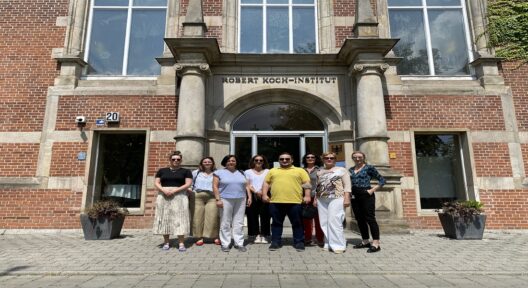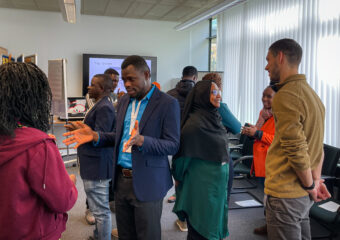Study Tour – Visit of a North Macedonian Delegation to the Robert Koch Institute
Next steps in supporting North Macedonia in implementing the operational plan to improve their national Public Health Emergency Operation Centre (PHEOC).

In November 2021, the Robert Koch Institute (RKI) together with the World Health Organization (WHO), organized a joint workshop with the scope to develop an operational plan for a well-coordinated response to public health emergencies for North Macedonia. Within this plan, strengthening North Macedonia’s central PHEOC capacity and establishing a network between subnational Public Health Centers and the national Institute for Public Health in the country was envisaged.
In this context, some of the RKI crisis management structures and exchange processes between national and state health authorities served as models for the partners in the past (e.g., the RKI PHEOC or the Epidemiological Teleconference (EpiLag)). For example, in 2017-2018, an exchange between subnational and national entities of the public health service, similar to EpiLag, was developed and regularly held in in North Macedonia until COVID-19, when it was interrupted due to high pandemic-related workload. In order to resume this process on a regular basis, as well as to get an even better picture of the structures and processes of the RKI PHEOC, a study tour to Berlin was organized. The North Macedonian delegation, consisting of partners from the Institute of Public Health, the WHO Country Office and the Ministry of Health of North Macedonia, visited the RKI on 04 and 05 July 2022.
On the first day of the study tour, two main topics were discussed: The surveillance of infectious diseases, including its digitalization and the RKI PHEOC. In the morning, the RKI unit for Surveillance presented the statutory surveillance for infectious diseases in Germany and the implementation process of the German Electronic Reporting and Information System (DEMIS). Afterwards, the surveillance system in Northern Macedonia and the current state of its digitalization were presented and discussed. The afternoon started with presentations on crisis management structures at the RKI and was followed by a visit to the PHEOC and a detailed discussion of work instructions and Standard Operation Procedures (SOPs) for setting up and running a PHEOC.
On Tuesday, the day started with a simultaneous translation of the RKI EpiLag from 5 July 2022 into English and a subsequent discussion about relevant processes of the EpiLag, e.g. the preparation of the EpiLag minutes, the input of the public health intelligence team to the EpiLag and the decision-making process to determine which epidemiological information is relevant for the EpiLag in Germany.
After that, further activities for the current GETPrepaReD project as well as for a potential next GHPP phase were discussed. With the support of other units of the RKI and the Charité Universitätsmedizin Berlin, the individual work packages of the West Balkan project proposal for the next GHPP phase were presented and initiation possibilities in North Macedonia discussed.
The afternoon was devoted to gaining practical insights into the cooperation between the RKI, Federal State Health Authorities (FSHA) and Local Health Authorities (LHA). For this purpose, the delegation visited first the LHA of Berlin-Mitte district, where the focus was on the implementation process of DEMIS in the LHA, the use of SurvNet@RKI and other software products for surveillance, as well as other topics such as COVID-19 contact tracing at high incidence times. Subsequently, the delegation visited the FSHA of Berlin (Landesamt für Gesundheit und Soziales Berlin; LAGeSo) and had an exchange about the tasks of these FSHA in the context of infection control, how the data of the LHA are used and processed on the federal state level, and what role the FSHA have in the case of outbreak investigations. In addition, other activities of the LAGeSo, such as the implementation of mosquito monitoring for Aedes albopictus in Berlin were presented to the participants.
The study tour was highly appreciated by the North Macedonian delegation, especially the topic of work instructions and SOPs were emphasized as having been extremely helpful. The partners plan to develop these documents for their own PHEOC, which will then be tested for their practicability in collaboration with the RKI.
Date: December 2022


